Main Pages
AboutPricingSecurityCareerCustomersContactBlogFeatures
Monitor & EnrichDiscover & SourceRFI & EngageOur Socials
LinkedinLegal
Terms of UseMay 9, 2025
Explore the top supply chain collaboration tools, comparing features, pricing, and suitability for various team sizes and needs.
Articles
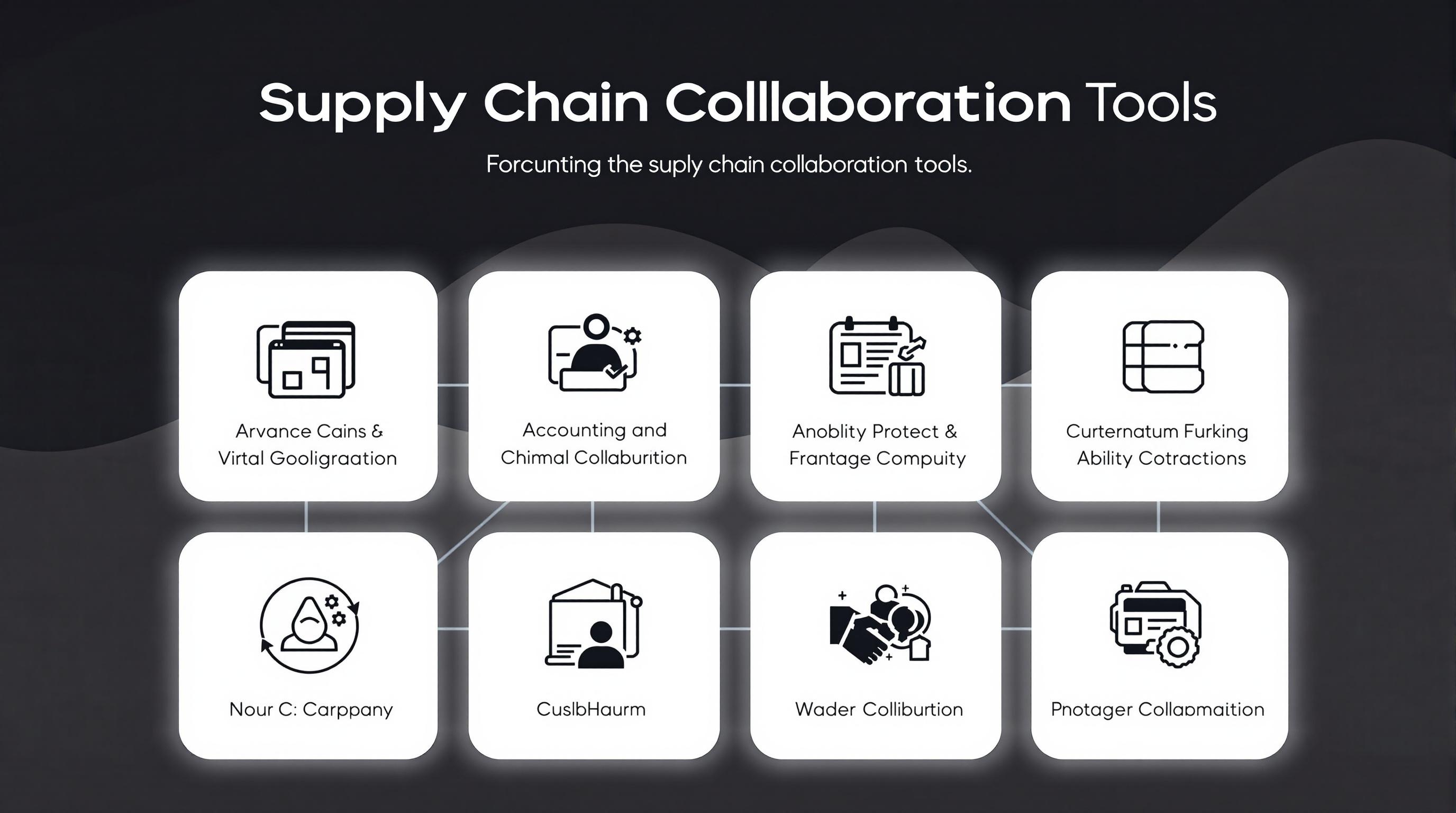
Tool NameBest ForKey FeaturesPricingChantySmall to mid-sized teamsTask management, Kanban view, integrations$3/user/monthIvaluaLarge enterprisesSourcing analytics, compliance toolsCustom pricingCoupaMid-to-large organizationsAI spend analysis, risk managementCustom pricingSAP AribaGlobal enterprisesProcurement automation, supplier networkCustom pricingOracle SCMLarge-scale operationsAI forecasting, real-time visibilityModular pricingJAGGAERComplex supply chainsProcurement automation, spend analyticsCustom pricingFind My FactorySMEs to enterprisesAI supplier search, collaboration tools€649+/monthDeepAIData-driven organizationsPredictive analytics, disruption detectionCustom pricing
Choose a tool based on your team's size, budget, and operational needs. Smaller teams may prefer Chanty for its simplicity, while large enterprises managing global supply chains might lean toward SAP Ariba or Oracle SCM Cloud. For AI-driven insights, DeepAI and Coupa stand out. Dive into the full article for detailed insights on each tool.
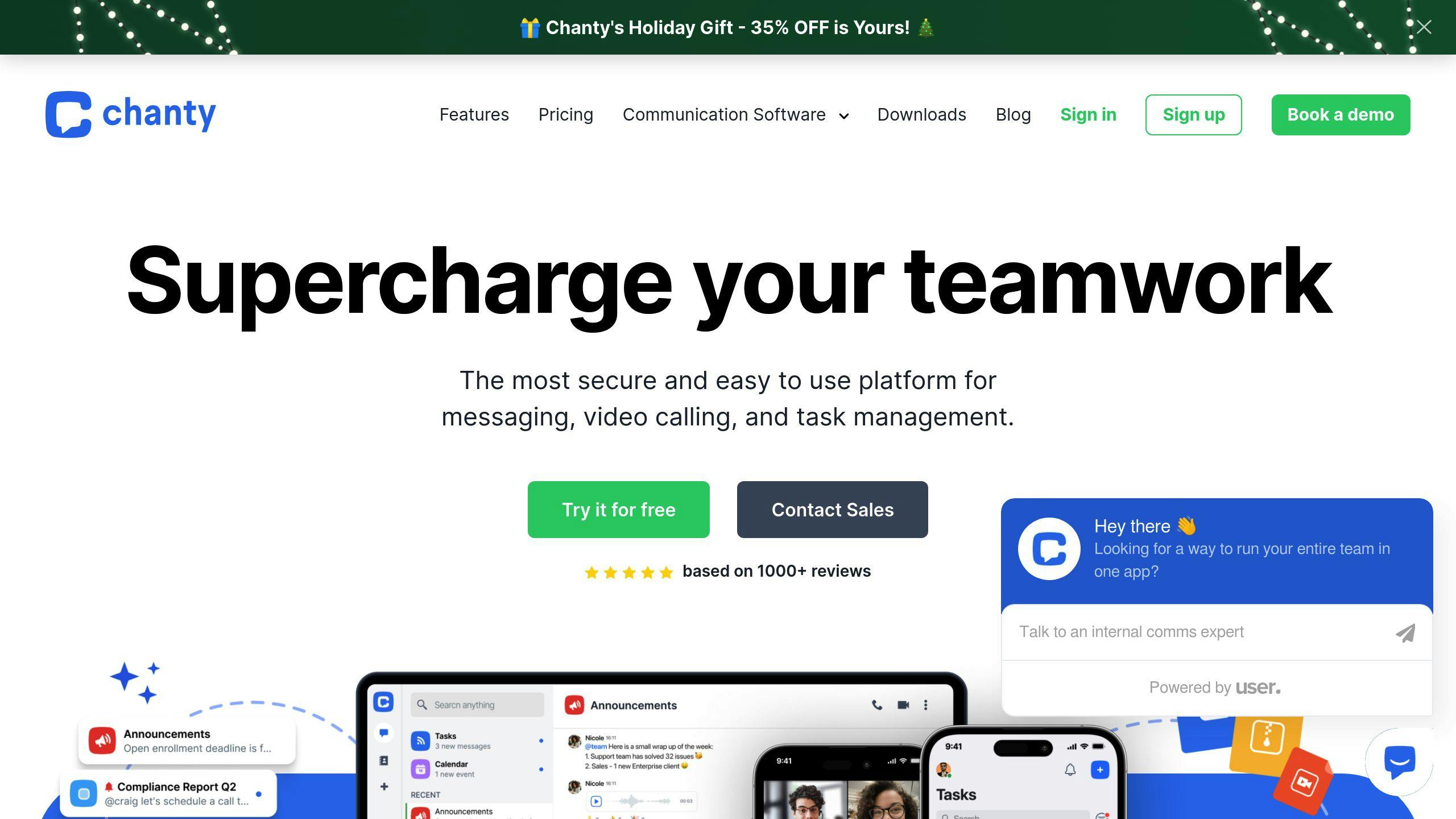
Chanty is a collaboration tool tailored for small to mid-sized teams, especially those managing supply chain operations. It combines communication tools with task management to streamline team workflows.
Chanty’s standout feature is its built-in task management system with a Kanban view. This lets teams map out workflows and track progress with ease. The platform supports inventory updates, supplier coordination, and daily operations, all within a single interface. Real-time communication ensures that critical updates are shared instantly.
Chanty offers a cost-effective pricing model:
Plan TypeUsersPriceKey FeaturesFree TierUp to 5$0Basic collaboration toolsBusinessPer user$3/monthFull feature access, unlimited history
The platform integrates with tools like Trello and Google Drive, helping teams centralize their workflows and minimize switching between apps.
Chanty’s simple interface is perfect for teams looking for ease of use. It’s quick to onboard new users and adapts well to evolving supply chain needs, making it a practical choice for growing businesses [1].
Chanty works best for:
Unlike complex enterprise solutions like SAP Ariba, Chanty focuses on simplicity and affordability, making it an excellent fit for smaller teams. Its combination of task management and collaboration tools ensures teams stay productive without feeling overwhelmed [1].
That said, larger organizations with more complex needs might find advanced platforms like Ivalua better suited to their requirements.
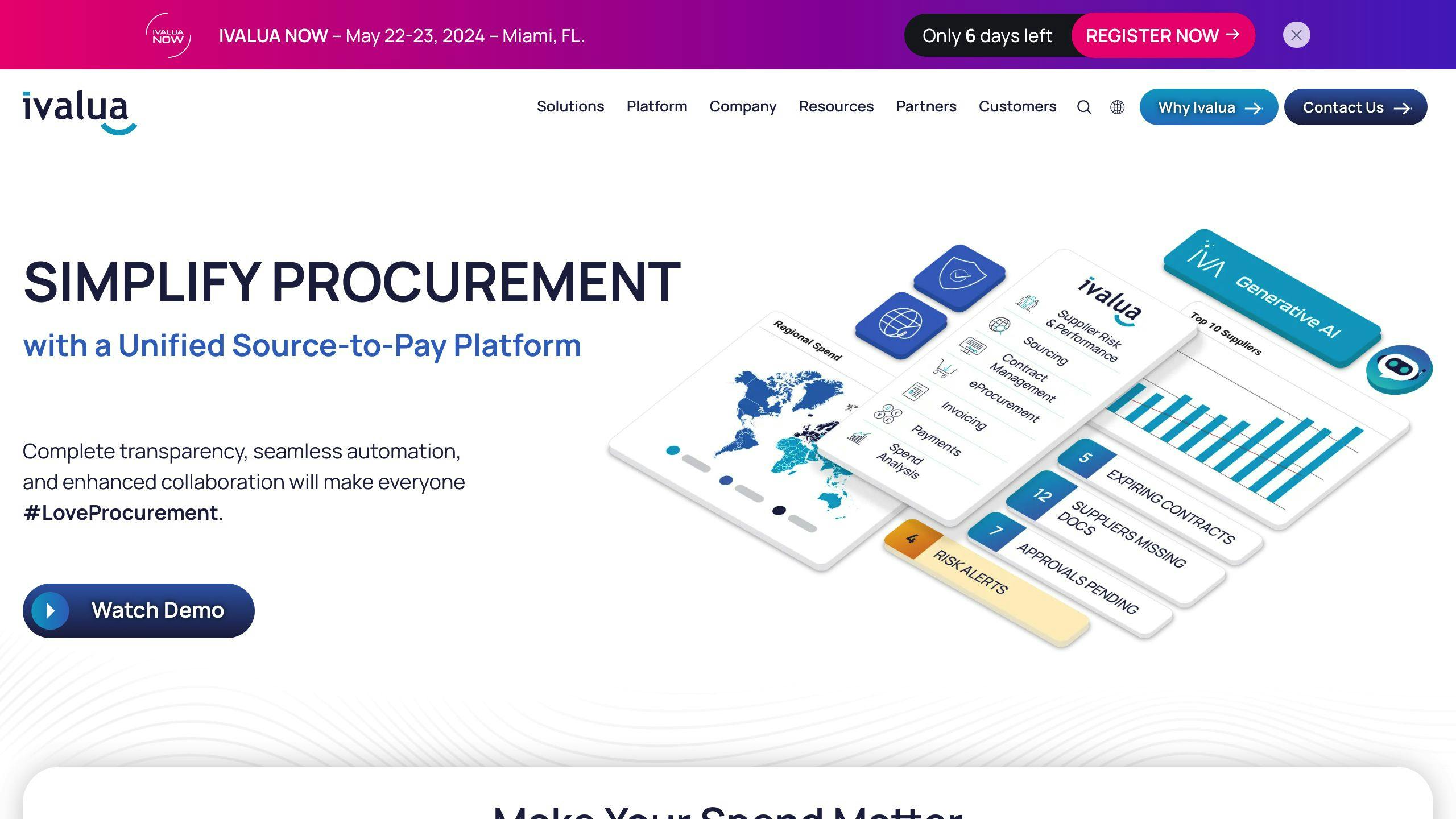
Ivalua is a platform built for large organizations, focusing on supplier management and procurement analytics. It’s designed to meet the needs of businesses with complex procurement operations.
Ivalua provides tools tailored for large-scale operations, including:
Thanks to its cloud-based design, Ivalua integrates smoothly with existing enterprise systems. Whether you're running a single department or managing a global supply chain, the platform can scale to fit your needs.
Ivalua prioritizes security with features like encryption, compliance monitoring, and regular audits. These measures align with the strict requirements of enterprise-level operations.
The implementation process is broken into four main stages:
Ivalua’s pricing is tailored to each customer. Costs depend on factors like the number of users, chosen features, integration needs, and support requirements.
Ivalua works best for:
Its focus on analytics and automation makes it a great choice for reducing supply chain risks and improving decision-making. For mid-sized organizations, tools like Coupa might offer a more balanced option.
Coupa is a cloud-based platform designed to help businesses manage spending and reduce supply chain risks. By leveraging AI-powered analytics and automation, it helps organizations streamline and modernize procurement processes.
Coupa provides tools like AI-based spend analysis, risk management dashboards, automated procurement workflows, and a centralized supplier management portal. These features simplify operations and support better decision-making.
The platform connects seamlessly with systems like SAP and Oracle, enabling real-time data synchronization. This creates a unified environment for managing supply chain activities efficiently.
Coupa delivers measurable results, such as an average ROI of 300% within the first year, up to 20% savings in procurement costs, and a 30% faster procurement cycle.
Coupa prioritizes strong security measures and offers comprehensive support for implementation. This includes dedicated teams, training programs, and 24/7 customer service to ensure a smooth transition.
Coupa's pricing model adjusts based on user needs, making it suitable for mid-to-large enterprises with complex supplier networks. Costs depend on factors like the number of users, chosen modules, integration needs, and support levels.
Coupa stands out with its focus on AI-driven analytics and clear ROI. While it excels in spend management and risk reduction, companies looking for broader procurement solutions might consider alternatives like SAP Ariba.
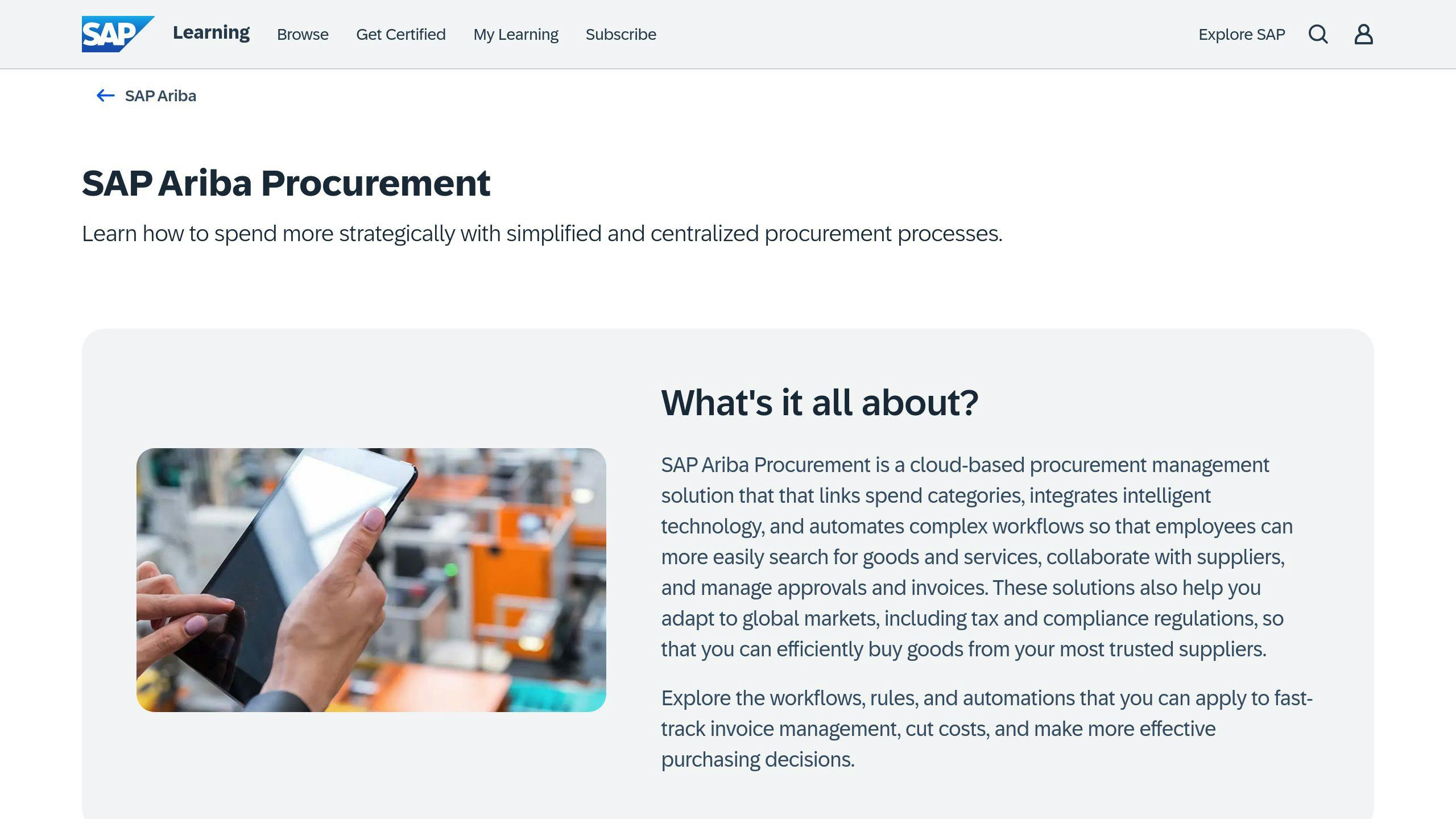
SAP Ariba is a platform designed to help enterprises manage complex global supply chains. It provides tools for better visibility and control, making it a strong option for organizations dealing with intricate supply chain operations.
The platform is built to streamline coordination with suppliers and vendors across various locations. It automates workflows and simplifies supply chain management with tools like automated order handling, real-time tracking, and integrated communication systems [2].
SAP Ariba connects buyers and suppliers worldwide through the SAP Business Network, which processes over $3 trillion in commerce every year. It also integrates easily with other SAP solutions, ensuring smooth supply chain operations [4].
One semiconductor company used SAP Ariba to manage assembly operations globally. The platform helped track parts and automate communication at different stages of the supply chain [2].
The platform includes strong security measures and ensures compliance with international standards, making it suitable for global operations. Its flexible architecture supports both local and international supply chains [2].
SAP Ariba has a 4.2/5 rating on Gartner Peer Insights, based on feedback from over 1,000 users [5]. Key benefits include:
FeatureBenefitProcess AutomationReduces manual work and errorsReal-Time TrackingImproves transparency and supplier coordinationCost ManagementHelps control expenses effectively
Pricing is tailored to the specific needs of each organization, depending on the number of users, selected modules, and support requirements [1].
SAP Ariba is a strong choice for large enterprises with complex, multi-national supply chains. However, for those focusing on advanced planning and forecasting, Oracle SCM Cloud may be a better fit.
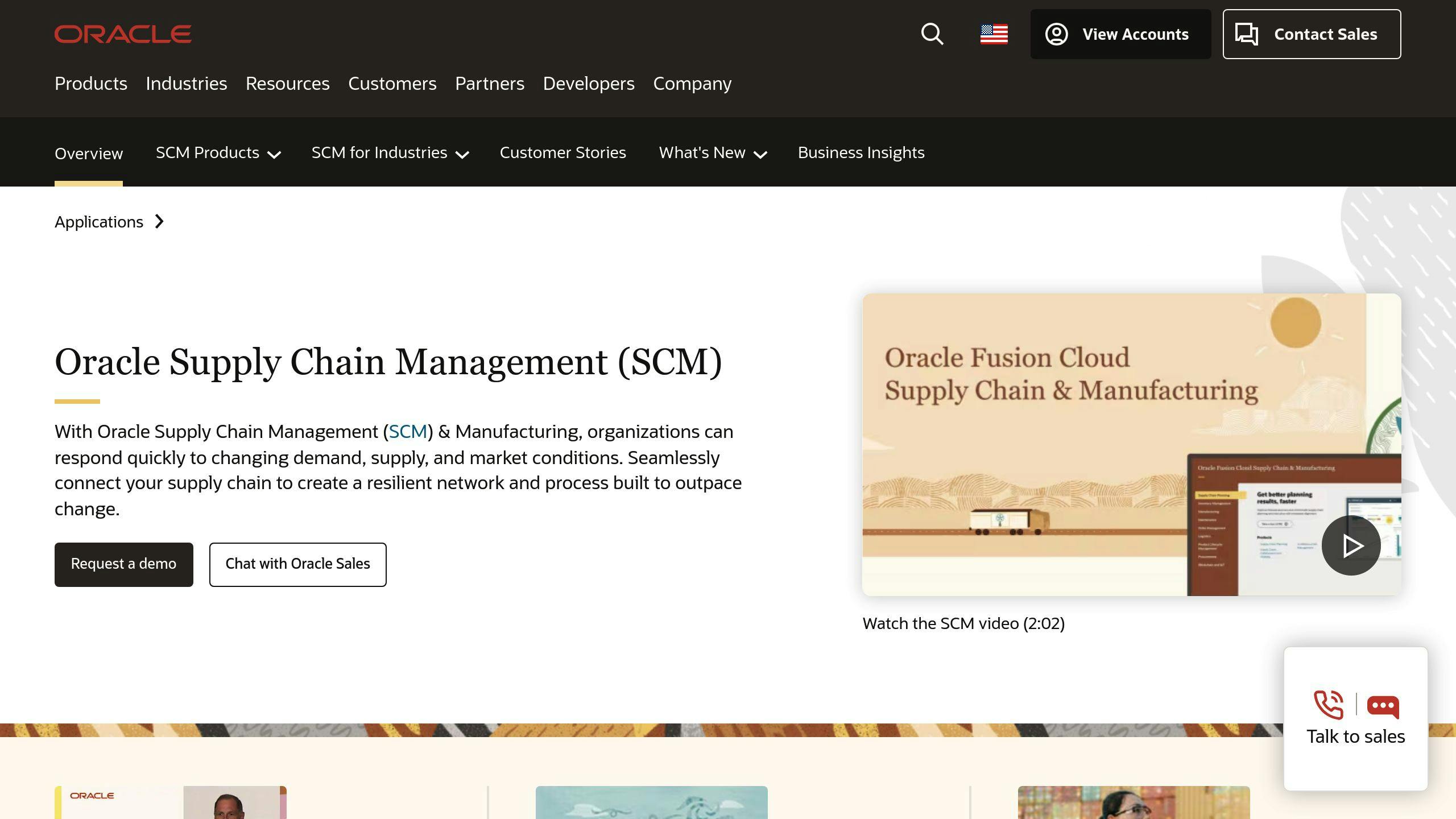
Oracle SCM Cloud is a supply chain management platform tailored for businesses handling intricate supply chain operations. It unifies various supply chain functions into one system, promoting better collaboration with partners and smoother communication and data sharing.
Oracle SCM Cloud integrates real-time data and analytics to simplify operations across global supply chains. Its AI-driven tools bring together procurement, inventory management, and logistics planning into a single system.
Oracle SCM Cloud uses AI to deliver:
The platform works effortlessly with Oracle ERP Cloud and Oracle CX Cloud, creating a unified system for consistent data flow. Its design allows companies to:
Oracle SCM Cloud uses a phased approach for deployment:
Oracle offers modular pricing, so businesses pay only for the features they use. Costs vary based on the scale of deployment and chosen functionalities.
This platform is best suited for large enterprises in industries like manufacturing, retail, and logistics that need advanced supply chain forecasting and visibility. However, businesses should evaluate their resources and training capabilities to ensure successful adoption.
While Oracle SCM Cloud delivers broad supply chain oversight, JAGGAER stands out for its focus on source-to-pay processes, making it a strong choice for complex procurement needs.

JAGGAER is a procurement-focused platform designed to simplify supplier collaboration and track performance effectively. It's particularly suited for enterprises dealing with intricate procurement processes.
JAGGAER provides tools that automate procurement, track supplier performance, and analyze spending. Here are its main features:
The platform integrates seamlessly with ERP systems like SAP and Oracle. This ensures real-time data synchronization and smooth supply chain operations by maintaining a steady flow of information across systems.
Built on a cloud infrastructure, JAGGAER supports business growth with features like flexible user management, modular tools, and multi-region deployment. Customizable workflows allow businesses to adapt the platform to their changing needs without losing efficiency.
JAGGAER follows a structured implementation process. It begins with assessing workflows, then moves to phased rollouts of features, staff training, and continuous system updates.
Costs are determined by factors such as the number of users, chosen modules, and the extent of implementation. Different support levels are also available to suit specific organizational requirements.
JAGGAER is best suited for:
While JAGGAER specializes in handling procurement complexities, the next section will explore how Find My Factory takes a unique approach to supplier discovery and manufacturing collaboration.
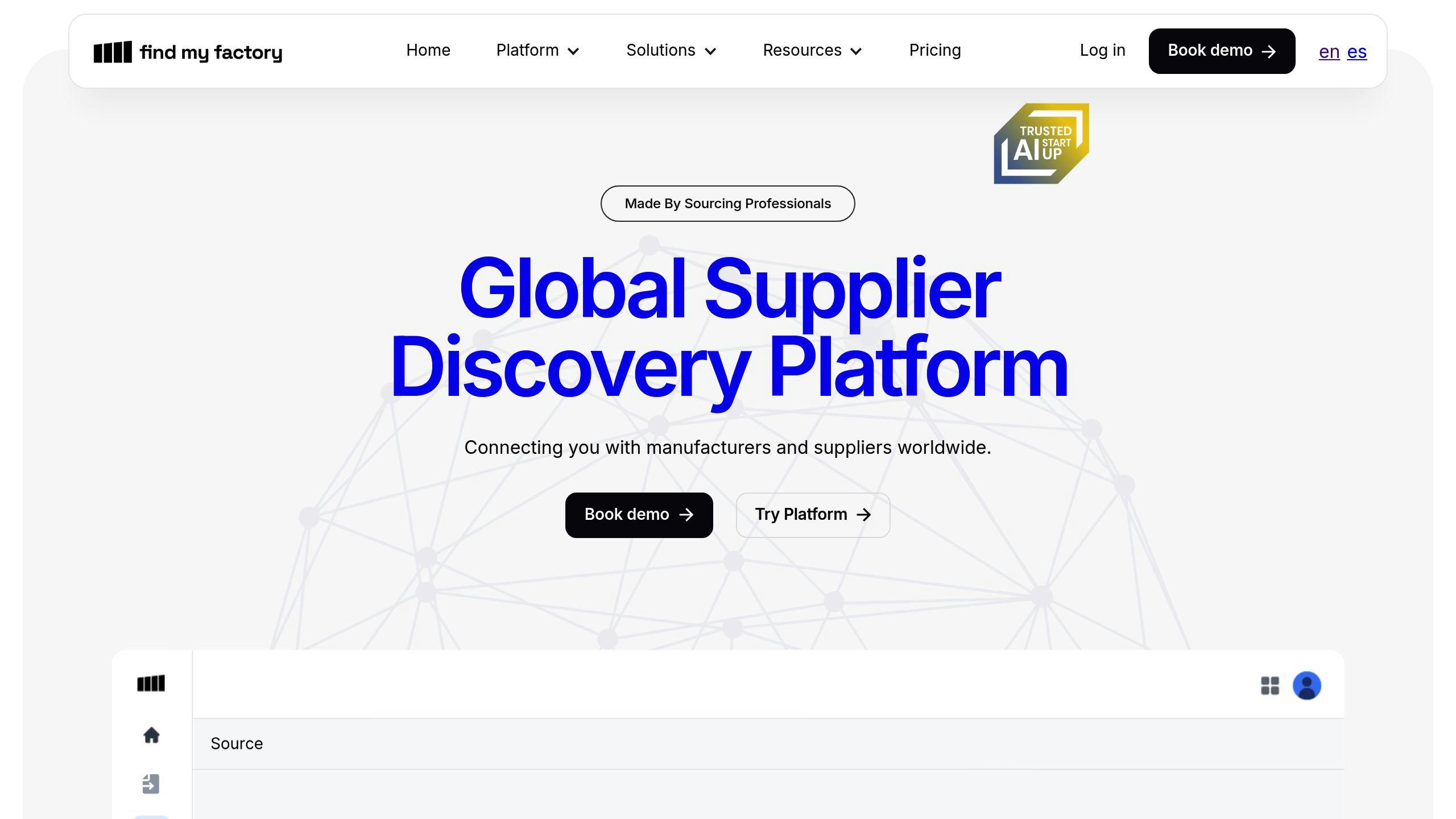
Find My Factory is an AI-powered platform designed to simplify how businesses find and work with manufacturing partners. Created by Dimitri Haid, Martin Schneider, and David Larsson, it focuses on making supplier discovery and collaboration more efficient.
Find My Factory stands out by combining AI-driven supplier search with tools for managing sourcing projects. Its three main modules include:
The platform works seamlessly with tools like Zapier, allowing it to fit into existing workflows. Its adaptability makes it a great choice for both small businesses and larger companies aiming to grow their supplier networks.
With ISO27001 certification in progress, Find My Factory emphasizes data protection. It also provides 24/7 customer support to keep sourcing operations running smoothly.
Plans start at €649/month for individual users. Team plans are available at €2,990/month, with custom pricing options for larger enterprises.
The platform is ideal for businesses in sectors like electronics, textiles, and automotive. It’s especially helpful for managing complex supply chains and finding suppliers efficiently. If supplier discovery is a priority, Find My Factory is worth considering.
In contrast, while Find My Factory focuses on supplier discovery and collaboration, DeepAI uses advanced analytics to improve supply chain decision-making.
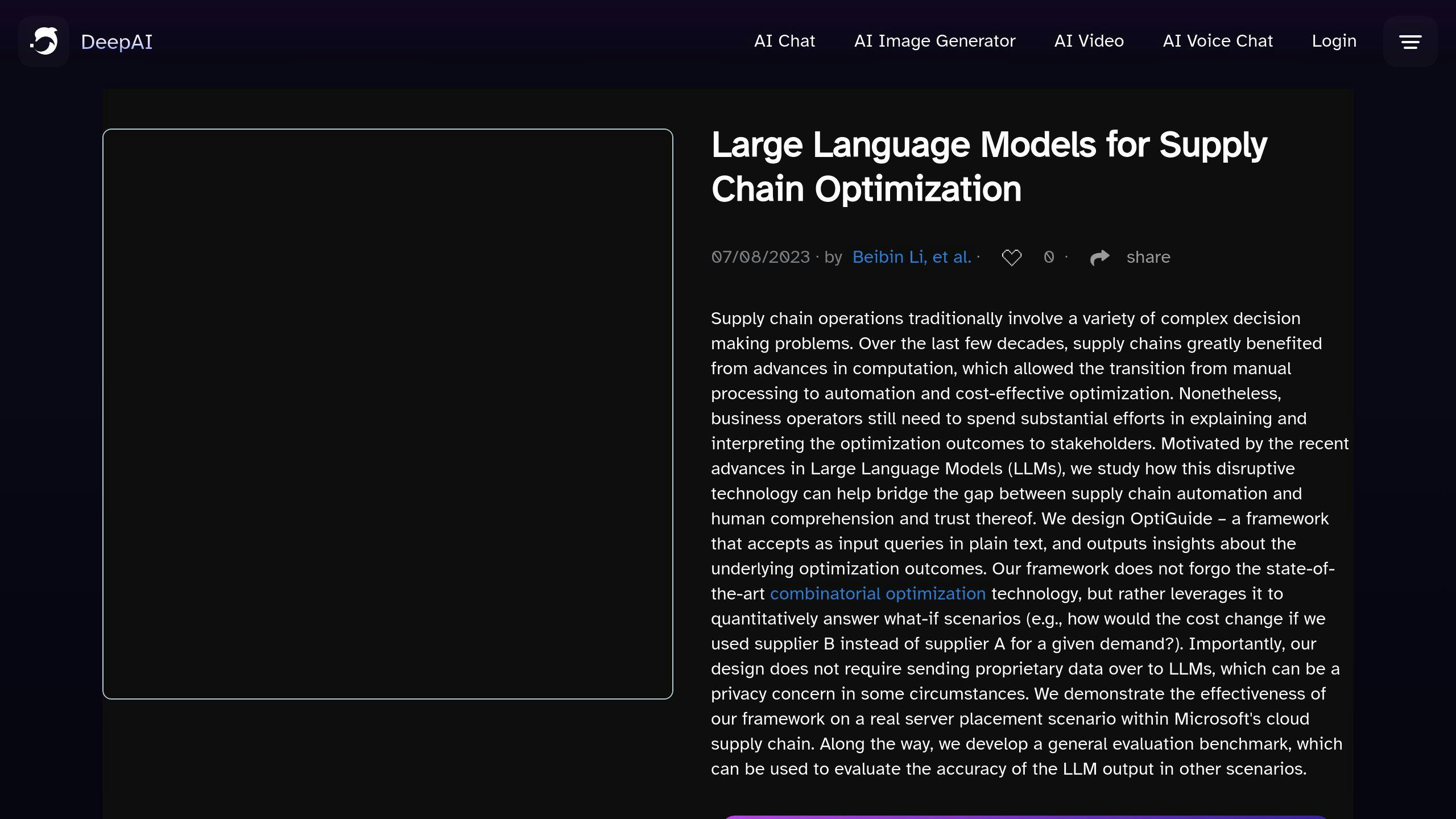
DeepAI takes a different approach to supply chain management by focusing on AI-powered analytics and decision-making tools, rather than typical collaboration features. While it’s not a standard collaboration platform, it boosts supply chain efficiency through artificial intelligence, streamlining communication and decision-making across partner networks.
DeepAI offers advanced tools powered by predictive analytics and machine learning, including:
Built on a cloud-based system, DeepAI integrates easily with existing infrastructure. Its design supports businesses of all sizes, making it a fit for both smaller companies and large enterprises looking to expand their AI capabilities.
DeepAI prioritizes data security with advanced encryption and secure storage. It also adheres to compliance standards specific to various industries.
To implement DeepAI effectively, businesses need to focus on key use cases, maintain high-quality data, and provide proper training for their teams to fully leverage AI-driven tools.
DeepAI offers custom pricing tailored to factors like the complexity of the solution, integration needs, data processing requirements, and the level of support.
DeepAI works best for:
Though DeepAI shines in predictive analytics, it’s designed to complement traditional collaboration platforms, offering a more complete approach to supply chain management.
Each tool comes with its own strengths and challenges, depending on factors like your organization's size, focus, and collaboration goals. Below is a comparison to help you find the best fit for your needs.
ToolProsConsChanty• Easy-to-use interface
• Kanban task management
• Affordable pricing
• Basic integrations• Limited features
• Not ideal for complex operations
• Few integration options
• Limited scalability for large enterprisesIvalua• Comprehensive supplier management
• Sourcing analytics
• Real-time dashboards
• Strong data visualization• Complicated setup
• Expensive for smaller teams
• Steep learning curve
• Requires significant resourcesCoupa• AI-powered spend analytics
• Risk management tools
• Extensive supplier network
• Performance tracking• Complex interface
• Lengthy implementation
• High cost
• Resource-heavySAP Ariba• Supply chain visibility
• Large supplier network
• Workflow automation
• Global tracking• High price point
• Complicated setup process
• Requires technical expertise
• Long deployment timelineOracle SCM Cloud• Real-time visibility
• AI-based forecasting
• All-in-one solution
• Strong security measures• Expensive for smaller businesses
• Complicated deployment
• Requires IT support
• Extensive training neededJAGGAER• Advanced procurement tools
• Performance tracking
• Customizable features
• Compliance monitoring• High pricing
• Complex features
• Lengthy onboarding process
• Rigid structureFind My Factory• AI-driven supplier search
• Enriched database
• Email integration
• Automation capabilities• Limited user seats
• Higher monthly costs
• Regional limitations
• Few integration optionsDeepAI• Predictive AI tools
• Actionable insights
• Strong security features
• Cloud flexibility• Dependent on data quality
• Requires user training
• Complex setup
• Variable pricing models
When deciding, think about your organization's size, budget, and specific needs. For example, SAP Ariba is highly effective for managing complex global logistics [2], while Chanty might be a better choice for smaller teams looking for simplicity [1].
If procurement is your focus, Ivalua and Coupa provide strong spend management solutions [1]. For advanced analytics and forecasting, DeepAI or Oracle SCM Cloud could be great options.
"The key to selecting the right tool is ensuring it fits current processes and can scale with the business. Full visibility in the supply chain, seamless collaboration, and adaptability to changing demands are crucial considerations." - Industry Expert [1]
If you're just starting out with supply chain tools, it might make sense to begin with a simpler platform. As your organization expands, you can shift to more advanced tools with broader capabilities.
The next section will guide you in evaluating these tools based on your specific supply chain priorities.
Choosing the right supply chain collaboration tool is a decision that can shape your organization's efficiency and ability to stay competitive. Each tool brings its own strengths and limitations, so it's important to match your choice to your organization's specific needs.
For smaller teams, Chanty stands out with its straightforward design and affordable $3/user pricing. On the other hand, larger enterprises with complex global operations might lean toward SAP Ariba or Oracle SCM Cloud, even with their higher costs [2]. Thanks to advancements in supply chain tech, platforms like Find My Factory and Coupa now use AI to improve supplier discovery, streamline collaboration, and deliver sharper analytics [1].
When evaluating tools, focus on factors like integration, scalability, analytics capabilities, and how easily your team can adopt the platform. For example, Coupa and Ivalua offer AI-driven analytics and real-time visibility to improve decision-making [3]. Meanwhile, platforms like Find My Factory provide flexible solutions, starting at €649 per month, catering to smaller teams while still offering room to grow.
Insights & Ideas